Our Team
Contact
Indigenous Health Lab
Social Science Centre
Room 3107
Western University
London, Ontario
519-661-2111 x 89310
Our Team
In the Indigenous Health Lab, Dr. Richmond supports the training and development of undergraduate and graduate students, as well as post-doctoral fellows.
If you are interested in pursuing graduate studies, please contact her directly (chantelle.richmond@uwo.ca).
PhD
Vanessa Ambtman Smith (she/her/they/them)
Tansi, I am niizhobinesiik (Two Thunderbirds) and a member of the Thunderbird Clan. I’m of mixed ancestry (Nehiyaw and Métis), and my roots are in the Great Plains (Treaty 6 territory). I’m a wife and a mother to two beautiful children- Carter, 11 and Carolena, 78 As a 60’s scooper and Indigenous adoptee, I was raised within a Dutch and Trinidadian family, living in both Alberta and Manitoba. These diverse influences have shaped who I am today. Through a purposeful journey as a facilitator walking between two worlds, I have worked in the field of Indigenous health for the past 22 years. I seek to be a catalyst for change, and have cultivated a skill set rooted in advocacy, health equity, Indigenous cultural safety and anti-racism, community engagement and leadership. I nurture connections and opportunities to enhance Indigenous inclusion and well-being through many capacities and dimensions, from research to strategic planning and participation in many critical touch points. I was the first Indigenous woman to be appointed to the London Police Services Board (2017-2019) and served on the Mayor’s Poverty Panel for the City of London. I support ongoing Indigenous planning across Ontario, and have held key roles at a national level, including facilitation in the National Inquiry on Missing and Murdered Indigenous Women, Girls and QTIPLGB2S (2018- 2019), and as a member of the Steering Committee to create a national Indigenous Health Policy Framework. In January 2020, I was appointed by the President of Western University to sit on their Anti-Racism Working Group as a graduate student.
Position: Assistant Professor, Department of Geography & Environment and the Indigenous Studies Program, Western University
Education: Current PhD Candidate at Western University; Trent University (BA); Graduate Certificate from Royal Roads University in Leadership
Teaching/Supervision: Teaches IS2218 – Contemporary Indigenous Issues and GEO/IS 2412, a new course on Indigenous Health and Healthcare Environments; Supervised by Dr. Chantelle Richmond
Research Area: Indigenous health geographies; Indigenous traditional healing spaces within a hospital context
Awards: Indigenous Mentorship Network Ontario Scholarship (2018 and 2019); Ontario Graduate Scholar (2019); Pierre Elliott Trudeau Doctoral Scholar (2019 – 2022); Vanier Graduate Scholarship (2020-2023); Dr. Valio Markkanen Indigenous Graduate Award for Academic Excellence (2020)
Publications:
Ambtman-Smith, V., and Richmond, C.A. 2020. Reimagining Indigenous spaces of healing: institutional environmental repossession. TIJIH, 2020, 1(1), pp.27–36.
Ambtman-Smith, V., Wysocki, K., Bomberry, V., Reitmeier, V., and Nightengale, E. 2022. You can’t just bring people here and then not feed them: A case in support of Indigenous-led training environments. Environment and Planning J, 2(1-2), 56-76
Ambtman-Smith, V., Crawford, A., D’Hondt, J., Lindstone, W., Linklater, R., Longboat, D., and Richmond, C.A. 2024. Incorporating First Nations, Inuit, and Métis traditional healing spaces within a hospital context: A place-based study of three unique spaces within Canada’s oldest and largest mental health hospital. IJERPH (forthcoming special issue)
Ambtman-Smith, V., Wysocki, K., Bomberry, V., Reitmeier, V., and Nightengale, E. 2022. You can’t just bring people here and then not feed them: A case in support of Indigenous-led training environments. Environment and Planning J, 2(1-2), 56-76
Contact Info: 519-661-2111*85103, vambtman@uwo.ca, Office 3213, SSC, Western University main campus, 1151 Richmond Street
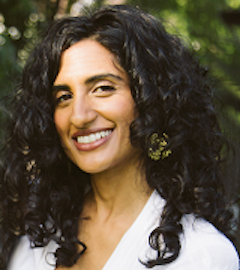
Asma Khanani, uses her creative background to explore relationships between health, well-being, identity and place as a health geographer. Her research and creative work draws heavily on relationship, storytelling and connection to place. Her approach encourages decolonizing approaches using creative qualitative methods to research marginalized and gendered experiences of displacement and resettlement. Asma’s current research seeks to narrate and humanize these experiences by detailing the relationship between therapeutic landscapes, place-making practice, material culture and resiliency. She is a PhD candidate at the University of Western Ontario. She is co-supervised by Dr. Bipasha Baruah.
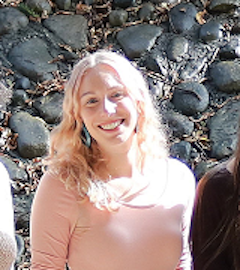
Elana Nightingale, is a PhD candidate in the Department of Geography at Western University under the supervision of Dr. Chantelle Richmond. She holds a Bachelor of Arts in Economics from Carleton University and a Master of Science in Local Economic Development from the London School of Economics and Political Science. She has previously worked in the field of socio-economic development in Arctic Indigenous communities, including community-based research and planning. Her research interests include the social determinants of Indigenous health, community economic development, community-based research methodologies and knowledge translation.
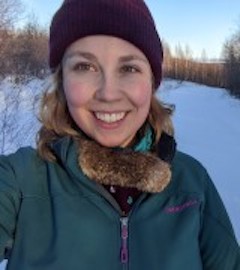
Emily Beacock, is a settler PhD candidate in the Department of Geography under the supervision of Drs. Diana Lewis and Chantelle Richmond. She has a Bachelor of Science in Biology (2016) from the University of British Columbia and a Master of Environmental Studies (2020) from Dalhousie University. Emily is particularly interested in exploring pathways to ethical, decolonial research governance for Indigenous community - academic partnerships in geography.
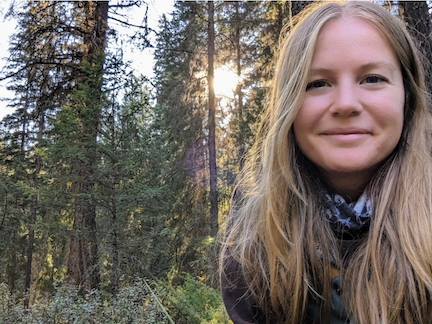
Koral Wysocki, is in the third year of her PhD with the Indigenous Health Lab in the Department of Geography and Environment at Western University. Under the supervision of Dr. Chantelle Richmond, Koral’s research employs regenerative development principles to uncover vital roles for allies in reconciliation and Indigenization efforts within higher education institutions. Koral’s engagement in collaboration with Indigenous peoples in the field of environmental restoration and community development on several continents has rooted her understanding of the strong connection between regenerative ways of organizing and lasting structural change. In her role as Partnerships Manager at ALUS, Koral draws on these experiences to build effective networks of collaborators which support ALUS’ portfolio of place-based restoration projects on marginal agricultural land. Koral is a settler scholar of Scottish, Hungarian, Ukrainian, and English descent based in British Columbia. She values nature-connection and its potential for healing so we (as allies) can show up ready to do work that moves us toward regenerative relationships with the places we call home, ourselves and each other.
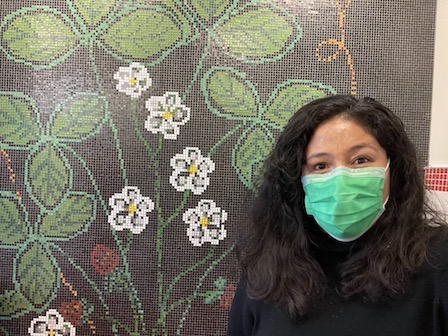
E. Victoria Bomberry
Shé:kon. Victoria Bomberry niiónkia’ts. Kanien’kehá:ka niwakhonhwentsiò:ten, wakkskaré:wake niwaki’tarò:ten táhnon Six Nations of the Grand River nitewaké:nonh. | Greetings. My name is Victoria Bomberry, and I am Mohawk, Bear Clan from Six Nations of the Grand River.
Under the supervision of Dr. Chantelle Richmond, I am a doctoral student in the Department of Geography and Environment at Western University. I earned my Hons. BSc. in Geography and Environmental Sciences at McMaster University and an MA in Geography from Western. I have been fortunate to work for community in many roles. As a Kanien’kehá:ka Resource Developer and Language Teacher on Six Nations. As a Research Assistant for the McMaster Indigenous Research Institute. And, most recently as Indigenous Data and Policy Analyst for the Coalition of Hamilton Indigenous Leadership. Each of these experiences and roles have shaped my approach to research that is grounded in Haudenosaunee ways of knowing and being while driven by community.
My doctoral research explores the ways Indigenous Peoples have influenced and contributed to municipal environments and the ways municipal environments shape urban Indigenous identities, cultures, and wellbeing. As an increasing number of Indigenous Peoples are choosing to live in urban centres, understanding these cross-influences are important to ensuring the health and wellbeing needs of Indigenous Peoples are appropriately reflected and respected in urban planning. Through a case study of Hamilton, Ontario, my PhD thesis explores the processes urban Indigenous leadership in Hamilton are engaging to reclaim and assert Indigenous identity and culture in the city and what implications these processes have for the health and wellbeing of the Indigenous community as well as the city.
Program: First-year doctoral student in Geography & Environment
Nation and Community: Kanien’kehá:ka, Ohswekén:’en (Mohawk from Six Nations of the Grand River)
Research Area: Indigenous geographies of health in municipal environments; Indigenous urban housing and homelessness
Masters
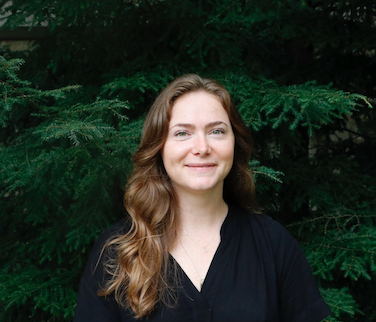
Rebecca Lily Rausch is an M.A student who joined the Indigenous Health Lab under the supervision of Dr. Chantelle Richmond in September of 2023. Originally from Caledon ON, Rebecca is a settler scholar with a deep care for patient safety and patient advocacy. She completed her undergraduate degree at the University of Victoria, with a directed study project focused on adverse events in hospitals. Together, with Dr. Richmond, Rebecca will be working on an M.A thesis project that will focus on the experiences of Indigenous patient navigators in Ontario.
Degree: M.A Geography and Environment
Research Area: Healthcare systems, Indigenous Patient Navigation
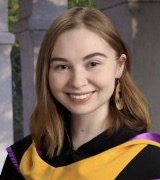
Laney Beaulieu (Medical Student). My name is Laney Beaulieu and I am Dene and Metis from the community of Fort Resolution (Deninu K'ue), Northwest Territories. My spirit name is Dream Weaver and my role within my community has always been to weave together Western and Indigenous ways of knowledge for the betterment of my people. I am currently working towards this goal as both a medical student at Schulich School of Medicine and as a researcher at Western University where I am currently completing a project on Dene conflict resolution techniques as a method of communication and reconciliation between Indigenous ad non-Indigenous groups. In the future I plan to return to the Northwest Territories to work as a doctor and continue my work in Indigenous wellbeing research.
Sarah Bradshaw MA student at Western University in the Department of Geography and Environment, under the co-supervision of Drs. Chantelle Richmond and Isaac Luginaah.
Clara Lewis MA student at Western University in the Department of Geography and Environment, under the supervision of Dr. Chantelle Richmond.

